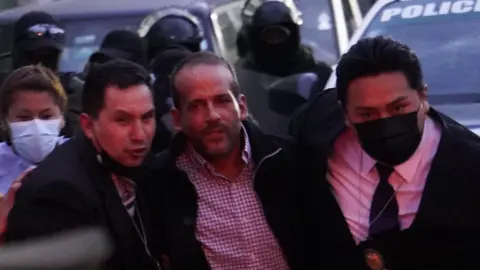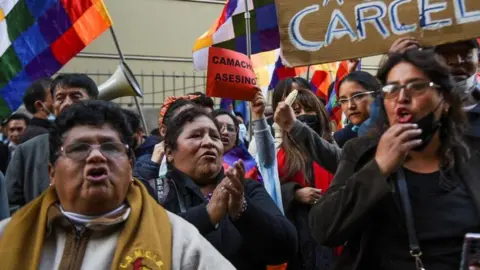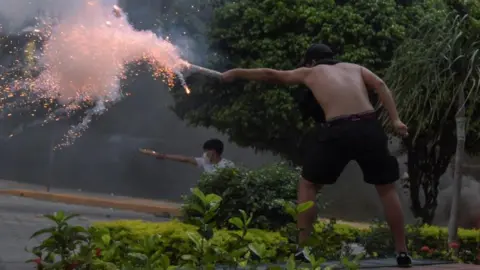Supporters of Luis Fernando Camacho staged violent protests
Violent protests have broken out in Bolivia following the arrest of a powerful opposition politician.
Luis Fernando Camacho, the right-wing governor of Santa Cruz province, was detained by armed police on Wednesday in an operation that his supporters said resembled “a kidnapping”.
On Thursday, a court ordered that Mr Camacho be held in pre-trial detention for four months.
The governor is one of the most divisive politicians in Bolivia.
State prosecutor Omar Mejillones said holding him in custody was a “precautionary measure”.
From his power base in Santa Cruz, Mr Camacho spearheaded the protests which led to the resignation of left-wing former president Evo Morales.
He has also challenged the current left-wing government of Luis Arce.
The state attorney’s office said Mr Camacho, 43, was arrested as part of an investigation into the events which led to President Morales’s departure from office in 2019, which it described as a “coup d’├йtat”.
An arrest warrant issued in October says he is facing charges of “terrorism”, without giving further details.
He was arrested on Wednesday in an operation which has drawn criticism from his followers.
 EPA
EPA
Luis Fernando Camacho was taken to La Paz
Graciela Ortiz, an assistant to Mr Camacho who was with him during his arrest, said a white patrol van intercepted their vehicle.
“People dressed in black with black guns got out and they started hitting the windows. They didn’t even tell us to get out, they just hit them with the back part of the weapons,” she told Reuters news agency.
Video from the scene showed one of the car windows was broken and witnesses said Mr Camacho was beaten before being thrown on to the ground and handcuffed while his security detail was tear gassed.
He was quickly transferred by helicopter to La Paz where he spent the night in a police cell.
In a statement released by his office, Mr Camacho said he had been “brutally kidnapped” and dismissed the allegations against him as “lacking truth and credibility”.
But Evo Morales, who in 2019 resigned from the presidency after 14 years in office as mass protests stoked by Mr Camacho swept through the country, welcomed it.
“Finally, after three years, Luis Fernando Camacho will answer for the coup d’├йtat that led to robberies, persecutions, arrests and massacres of the de facto government,” he said.
 Reuters
Reuters
Mr Camacho is a divisive figure in Bolivia and his arrest prompted celebrations in La Paz
Mr Morales quit as president after the chief of the army urged him to step down amid protests over allegations of vote-rigging in the 2019 election.
A right-wing senator, Jeanine ├Б├▒ez, replaced him in office and served as president for a year before a re-run of the election brought Morales-ally Luis Arce to power.
Mr Morales and his supporters condemn have denounced the events of 2019 as a seizure of power and Jeanine ├Б├▒ez has since been sentenced to 10 years in jail for “decisions contrary to the constitution”.
Supporters of Mr Camacho fear he could face a similar fate for his role in the 2019 protests.
News of Mr Camacho’s arrest spread quickly in his home province. His supporters blocked roads in Santa Cruz and set fire to the attorney general’s office.
They also briefly disrupted operations at the city’s two airports, in an apparent attempt to prevent Mr Camacho from being transferred to Bolivia’s administrative capital, La Paz.
Unrest in Santa Cruz, Bolivia’s economic powerhouse and its largest farming region, has the potential to cause disruption well beyond the province’s limits.
Last month, a 36-day general strike in Santa Cruz cost Bolivia an estimated $1bn (┬г830m) in losses.
Mr Camacho had been behind the strike, demanding that a delayed census be brought forward by a year.
Residents of Santa Cruz believe the census – originally scheduled for 2022 but delayed by the government to 2024 – will reflect their growing power and increasing population and that as a result, they will be granted more seats in Congress and allocated higher tax revenues.
The strike was called off at the end of November after lawmakers passed a decree guaranteeing it would be held in 2024 with no further delays permitted.
But many in Santa Cruz were not happy with the compromise and the arrest of their governor is likely to trigger fresh strikes.
Source link : http://www.bing.com/news/apiclick.aspx?ref=FexRss&aid=&tid=673015a004a3494e8b436e80dee45e83&url=https%3A%2F%2Fwww.bbc.com%2Fnews%2Fworld-latin-america-64113400&c=297238909663279072&mkt=en-us
Author :
Publish date : 2022-12-28 15:46:00
Copyright for syndicated content belongs to the linked Source.













